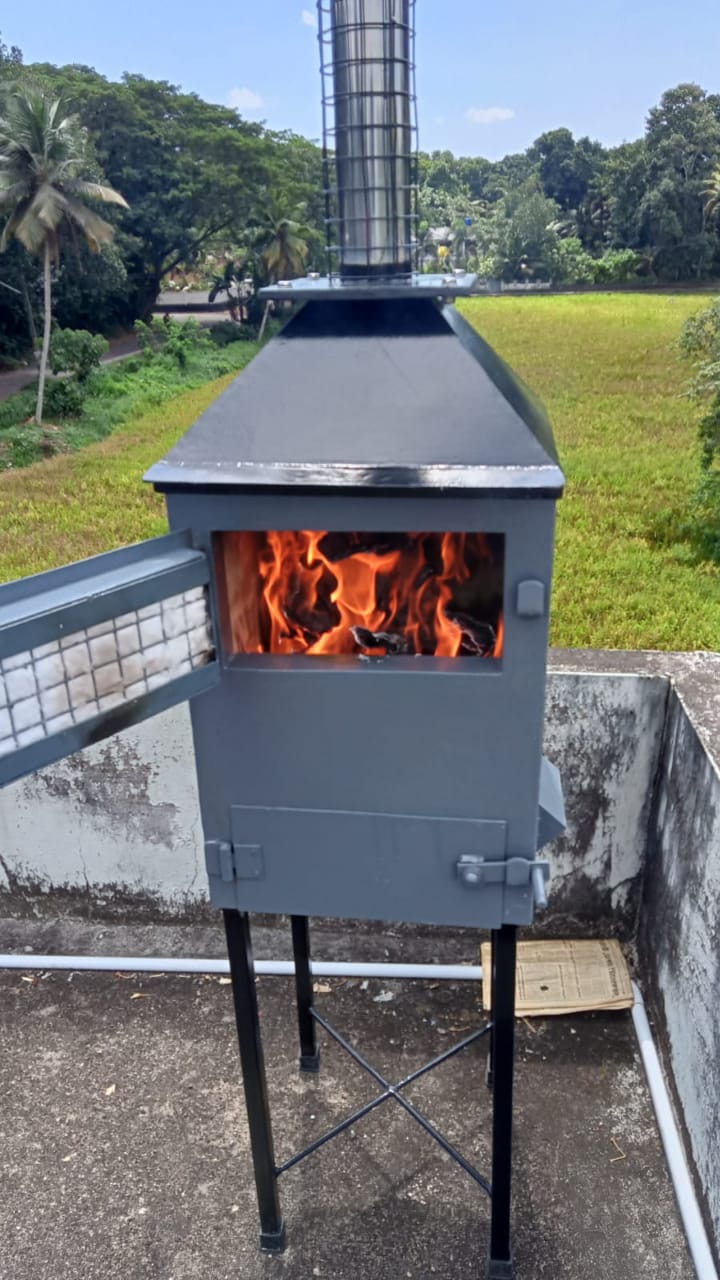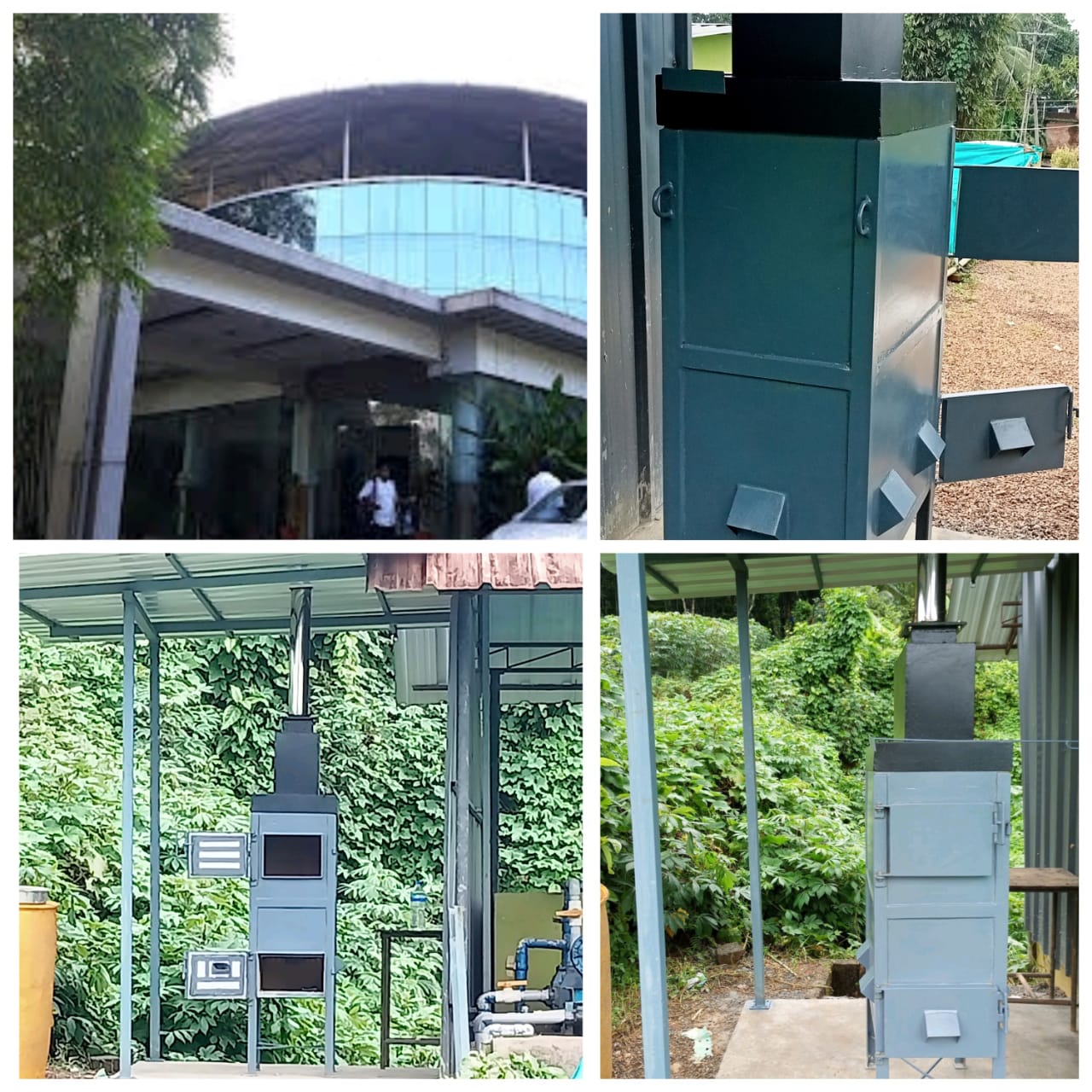Vesta Industries
12A , KADS Village Square, Thodupuzha Mangattukaval Bypass, Near KADS Village, Thodupuzha, Idukki, 685608
Since : 2019
12A , KADS Village Square, Thodupuzha Mangattukaval Bypass, Near KADS Village, Thodupuzha, Idukki, 685608
Since : 2019
In Idukki, diesel incinerators dealers offer essential solutions for effective waste management. These devices are crucial for disposing of various types of waste materials efficiently and responsibly. Whether for commercial, industrial, or residential purposes, diesel incinerators play a vital role in maintaining cleanliness and environmental standards. Diesel incinerators dealers specialize in the sale, installation, and maintenance of incineration equipment powered by diesel fuel.
Incinerators play a crucial role in modern waste management by offering efficient and environmentally responsible solutions for waste disposal. Dealers of incinerators provide essential equipment and services to facilitate safe and effective waste incineration processes. Incinerators are specialized facilities or equipment designed to combust waste materials at high temperatures. This process reduces the volume of waste and converts it into ash, flue gas, and heat. Incineration is particularly effective for managing certain types of waste, including medical waste, hazardous materials, and municipal solid waste.
Volume Reduction: Incinerators significantly reduce the volume of waste. By burning solid waste at high temperatures, they can reduce its volume by up to 90%, which minimizes the amount of waste that needs to be landfilled.
Energy Recovery: Waste incineration generates heat, which can be used to produce steam or electricity through turbines and generators. This process, known as waste-to-energy, utilizes the heat produced during incineration to generate power, thereby contributing to energy conservation and reducing dependency on fossil fuels.
Safe Disposal of Hazardous Waste: Incinerators are effective in handling hazardous materials, such as biomedical waste, chemical waste, and certain industrial by-products. These materials can be safely disposed of through incineration, reducing the risk of environmental contamination and public health hazards associated with improper disposal.
Reduction in Greenhouse Gas Emissions: Compared to landfilling, incineration can help mitigate greenhouse gas emissions. Landfills produce methane, a potent greenhouse gas, as organic waste decomposes anaerobically. Incineration prevents the release of methane and other volatile organic compounds into the atmosphere.
Pathogen Destruction: Medical waste incinerators are specifically designed to handle infectious waste, including needles, syringes, and contaminated materials. The high temperatures reached during incineration effectively destroy pathogens, ensuring safe disposal and minimizing the risk of spreading infectious diseases.
Space Saving: Incinerators reduce the need for expansive landfill sites. By minimizing the volume of waste that requires landfilling, incineration helps conserve valuable land resources and reduces the environmental footprint associated with landfill operations.
Controlled Environment: Modern incinerators are equipped with advanced technologies for emission control, such as scrubbers, filters, and electrostatic precipitators. These technologies capture and treat pollutants, including particulate matter, heavy metals, and acid gases, before they are released into the atmosphere, ensuring compliance with strict environmental regulations.
Resource Recovery: Incinerators can recover metals from the ash residue produced during combustion. After incineration, the remaining ash may contain recyclable materials, such as ferrous and non-ferrous metals, which can be extracted and recycled, promoting resource recovery and circular economy principles.
Flexibility in Waste Management: Incinerators are versatile and can be adapted to handle various types of waste streams, including municipal solid waste, industrial waste, agricultural waste, and sewage sludge. This flexibility allows municipalities, industries, and healthcare facilities to tailor waste management strategies to their specific needs and regulatory requirements.
Public Health Benefits: Properly managed incineration facilities contribute to public health by reducing the potential for disease transmission from infectious waste and minimizing exposure to harmful chemicals and contaminants found in certain types of waste.
Look for dealers with extensive experience in supplying and installing incinerators. Experience indicates familiarity with different types of incinerators and their applications across various industries and sectors.
Choose dealers that offer a diverse range of incinerator models and sizes to cater to different waste volumes and types. They should provide options for small-scale units suitable for clinics and laboratories, as well as larger models for industrial and municipal waste.
Some waste streams may require specific handling and disposal methods. Ensure the dealer can customize incinerators to meet your specific operational and regulatory requirements, such as emissions control and waste throughput.
Verify that the incinerator models offered by the dealer comply with local and international environmental regulations and emission standards. Dealers should be able to provide documentation and certifications to demonstrate compliance.
Consider the level of after-sales service and technical support offered by the dealer. This includes installation assistance, training for operators, maintenance services, and troubleshooting support. Prompt and reliable service minimizes downtime and ensures continuous operation of the incineration system.
Check the reputation of the dealer within the industry and seek references from past clients. Positive testimonials and reviews indicate reliability, quality of products, and customer satisfaction.
Compare pricing structures and overall cost-effectiveness among different dealers. Consider not only the initial purchase price but also ongoing operational costs, such as fuel consumption, maintenance, and disposal of ash residues.
Review the warranty terms offered by the dealer for incinerators and associated equipment. Additionally, inquire about available support contracts for preventive maintenance and emergency repairs to ensure long-term reliability and performance.
Choose dealers that prioritize environmental sustainability in their product offerings and operations. Look for features such as advanced emission control technologies, energy recovery options, and adherence to green practices.
Lastly, consider the responsiveness and quality of customer support provided by the dealer. Clear communication, accessibility, and responsiveness to inquiries and concerns are crucial for a successful partnership.
Incinerators serve various crucial applications across different sectors due to their capability to efficiently dispose of waste through high-temperature combustion. Here are some common applications of incinerators:
Incinerators are extensively used in healthcare facilities for the safe disposal of medical waste, including infectious materials, pathological waste, sharps, and expired pharmaceuticals. High temperatures ensure complete destruction of pathogens and contaminants, reducing the risk of infection and environmental contamination.
In urban areas, incinerators play a vital role in managing municipal solid waste (MSW). They can process large volumes of mixed waste, including household garbage, paper, plastics, and organic materials. Incineration reduces waste volume significantly, minimizing the need for landfill space and controlling methane emissions from decomposing organic waste.
Industries generating hazardous waste, such as chemical plants, pharmaceuticals, and manufacturing facilities, rely on incinerators for safe disposal. Hazardous waste incineration destroys toxic substances, pollutants, and industrial by-products, ensuring compliance with stringent environmental regulations and preventing contamination of soil and water sources.
Incinerators are used to treat sewage sludge generated by wastewater treatment plants. Thermal treatment at high temperatures reduces sludge volume, eliminates pathogens, and stabilizes organic matter. Incineration also converts sewage sludge into ash, reducing disposal costs and potential environmental impacts associated with land application.
In agriculture and veterinary practices, incinerators are employed for the disposal of animal carcasses and by-products. This includes livestock mortality management, diseased animal disposal, and destruction of contaminated animal products. Incineration ensures biosecurity by preventing the spread of diseases and pathogens.
Various industries utilize incinerators to manage specific types of industrial waste, such as chemical residues, solvents, oils, and manufacturing by-products. Incineration reduces waste volume, destroys hazardous chemicals, and facilitates resource recovery through energy conversion or material recycling.
Modern incinerators are equipped with energy recovery systems, such as heat exchangers or steam generators, to convert thermal energy from combustion into electricity or heat. This process, known as waste-to-energy (WtE), enhances the sustainability of waste management practices by offsetting fossil fuel consumption and reducing greenhouse gas emissions.
During emergencies, natural disasters, or disease outbreaks, portable or mobile incinerators are deployed for rapid and safe waste disposal. These incinerators provide on-site solutions for managing medical waste, contaminated materials, and other hazardous debris, ensuring public health and environmental safety.
Incinerators are also used in research and development settings to study combustion processes, emissions control technologies, and environmental impact assessments. These studies contribute to advancing incineration technology, improving efficiency, reducing emissions, and enhancing environmental sustainability.
In remediation projects, incinerators are employed to treat contaminated soils, sediments, and debris by thermal destruction of organic pollutants, hydrocarbons, and hazardous chemicals. Incineration helps restore polluted sites, mitigate environmental risks, and support ecosystem recovery efforts.
Dealers typically offer a variety of incinerators designed for medical waste, municipal solid waste, hazardous materials, and specialty applications like animal carcass disposal and industrial waste.
Choosing the right incinerator dealer involves considering factors like their experience, range of products, compliance with regulations, support services, and cost-effectiveness over the equipment's lifecycle.
Yes, reputable incinerators dealers ensure their equipment complies with local, national, and international environmental regulations. They provide guidance on obtaining necessary permits for installation and operation.
Incinerators dealers typically offer maintenance services such as routine inspections, parts replacement, emission monitoring, and emergency repairs to ensure optimal performance and compliance.
Yes, incinerators dealers often provide consulting services to help with waste management planning. They assess waste composition, volume, and regulatory requirements to recommend suitable incineration solutions.

Idukki, Thodupuzha

Idukki, Thodupuzha